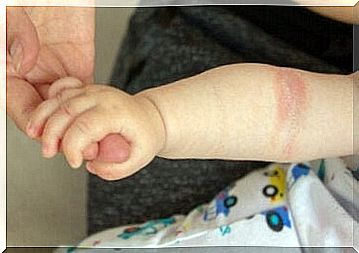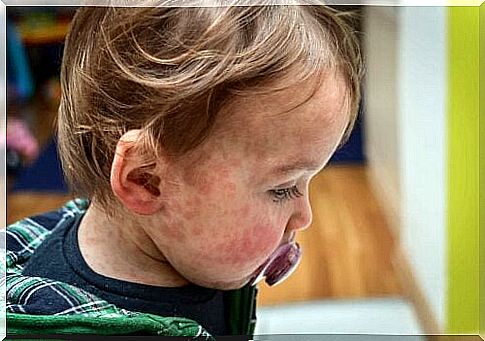Nutrition And Eczema In Babies – Being Parents

Did you know that 20% of children often get eczema? It is the most common inflammatory skin disease in this age group. It is also linked to the risk of developing a food allergy, asthma or rhinoconjunctivitis.
This is why we are going to tell you how diet influences eczema in babies. Remember that it is also known as atopic dermatitis.
In this sense, environmental pollution caused by traffic and smoking increases the risk of eczema. In addition, it increases the likelihood of infection. The same goes for dust mites and pollen.
Treatment involves the use of drugs, creams and oils for topical use but also the removal of the allergens concerned. It varies depending on the severity of the symptoms, so it is essential to consult a specialized professional.
Thus, following the diversity of approaches, the European Academy of Dermatology and Venereology published a consensus in 2018.
Diet and eczema in babies

The benefits of omega-3s in our diet on eczema
Research began when it was discovered that the amount of linolenic acid in the skin is low due to a lack of specific enzymes. In return, they lack the protein watermark, which constitutes the protective barrier of the skin. This is one reason why you can get Staphylococcus aureus infections.
According to the second part of the consensus of the Academy of Dermatology, evening primrose and borage oils by oral administration have no advantage. They are therefore not recommended as part of the treatment. However, they are useful topically.
Additionally, taking 5.4 grams of DHA (docosahexaenoic acid) for 8 weeks reduces the severity of eczema. Indeed, they have a strong anti-inflammatory power.
Omega-3s are also found in fatty fish, the recommended consumption of which is twice a week. The consumption of nuts and seeds is also rich in omega-3s. Remember to grind them to prevent your child from choking. Also, don’t forget to use virgin olive oil when cooking.
Vitamin D the key to preventing eczema in infants
Although it is not known whether a lack of vitamin D is a cause or a consequence of dermatitis, supplementation has worked well. On the one hand, 90% of children aged 1 year and over reduce the occurrence of skin infections.
On the other hand, a low level of vitamin D during pregnancy increases the risk of developing eczema in children. It is therefore important to be in the sun for at least 10 to 15 minutes a day to synthesize vitamin D.
The dose for infants is 1000 international units (IU) of D3 per day, as long as the mother does not give a supplement. Also, as they gain weight, they can increase from 1000 to 1000 for every 5 kilograms.
Are probiotics effective in reducing eczema in babies?
Most research on probiotics shows promising results, especially for the Lactobacillus species mix versus Bifidobacteria alone. However, the recommended doses, duration and specific strains have not yet been established.
In addition, some strains such as L.rhamnosus GG are ineffective when administered preventively during the first six months of life.
Allergies and eczema: consequences on the diet
Finally, we know that there is a positive relationship between eczema and allergies in babies and children. This does not mean that we have to eliminate from our consumption foods such as dairy products and eggs. Or even nuts or peanuts. The main reasons for this statement are as follows:
- The difficulty of maintaining the diet in the long term.
- The scarce evidence of the benefits of their elimination.
- Lack of effectiveness in children.

In addition, a positive allergy test is required to stop consuming the food to which you think you are allergic.
Given this relationship, we wondered whether advancing or delaying the introduction of foods had an effect on increasing predisposition. After investigation, there was no noticeable effect, although there is a window between 4 and 6 months.
In summary, at the slightest suspicion, consult a dermatologist for advice on how to treat food and eczema in babies.
If you know which foods make your little one’s symptoms worse, see a dietitian. He will explain to you the most suitable diet for your child.
It is also important to keep your baby well hydrated by giving him water to drink. Finally, it is also important to use moisturizers specialized for sensitive skin. This will help improve the health of your baby’s skin.









